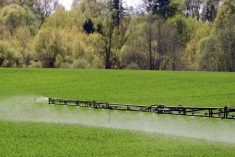The National Farmers Union wants Health Canada to follow the precautionary principle and impose a five year moratorium on neonicotinoid seed treatments.
Ontario farmer and NFU director Nathan Carey said today that the moratorium is necessary because neonicotinoids are a threat to bees and natural ecosystems.
“In calling for a five year moratorium on the use of neonicotinoid seed treatments for field crops, the NFU is recommending that the PMRA (Pest Management Regulatory Agency) invoke the precautionary principle, which calls on public authorities to prevent irreversible harm when it is within their power to do so, even when scientific certainty is incomplete.”
Read Also

Alberta crop conditions improve: report
Varied precipitation and warm temperatures were generally beneficial for crop development across Alberta during the week ended July 8, according to the latest provincial crop report released July 11.
The NFU said the moratorium would provide the necessary time to study the impacts on neonicotinoids on “broader agricultural and natural ecosystems” and consider alternative farming practices.
With its stance, the NFU joins the Ontario Beekeepers’ Association, Federation Des Apiculteurs Du Quebec, the David Suzuki Foundation and the Sierra Club of Canada in calling for a neonic ban in Canada.
In September, the PMRA announced that treating corn and soybean seed with neonicotinoids is not sustainable. The agency determined that insecticide-laden dust during spring planting had killed bees at hundreds of bee yards across Ontario in 2012 and 2013.
The PMRA proposed several measures to minimize the risk to bees, including use of a new seed lubricant to reduce the amount of dust from corn planters.
The NFU said the proposed changes are insufficient.
“The protective measures proposed by the PMRA, such as enhanced labelling, appear to be another instance of our federal government acting in the interest of agro-chemical and seed companies, rather than in the interest of Canadians and our environment,” said Ann Slater, NFU vice-president of policy and a farmer near St. Marys, Ont.
In addition to NFU’s plea for a Canadian moratorium, the European Food Safety Authority (EFSA) said today that imidacloprid, a type of neonicotinoid widely used as a seed treatment, may adversely affect the human brain.
EFSA scientists are recommending that acceptable exposure levels be lowered for imidacloprid and acetamiprid, another neonicotinoid.
“(Scientists) found that acetamiprid and imidacloprid may adversely affect the development of neurons and brain structures associated with functions such as learning and memory,” it said.
“Some current guidance levels for acceptable exposure to acetamiprid and imidacloprid may not be protective enough to safeguard against developmental neurotoxicity and should be reduced.”
To be more informed about the issue:
http://www.producer.com/2013/12/seed-agent-reduces-dust-concerns/
http://www.producer.com/2013/12/link-between-bird-decline-insecticides-examined/
http://www.producer.com/daily/new-seed-agent-reduces-neonicotinoid-laden-dust-bayer/
http://www.producer.com/2013/11/govt-should-play-role-when-valuable-research-ignored/
http://www.producer.com/2013/11/man-apiarists-fear-grower-backlash-for-blame-over-bee-losses/
http://www.producer.com/2013/11/basf-challenges-european-union-insecticide-ban/
OR experience producer.com’s search of related stories for yourself: Search neonicotinoids

















